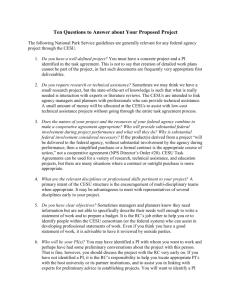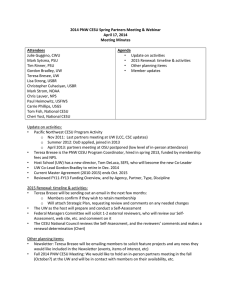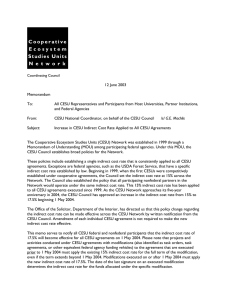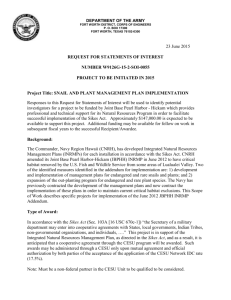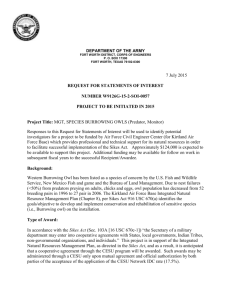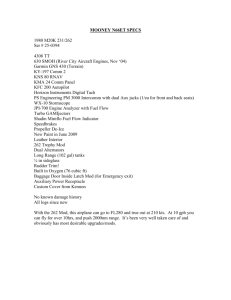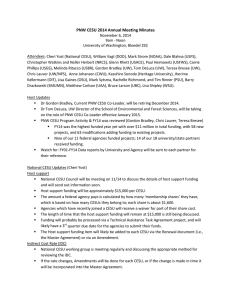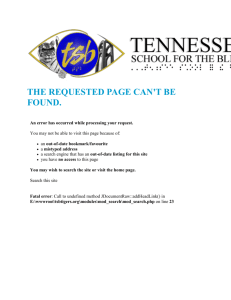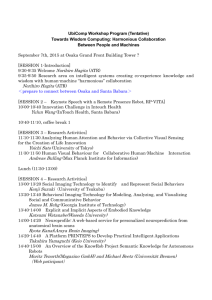Steps for Conducting A CESU Project
advertisement
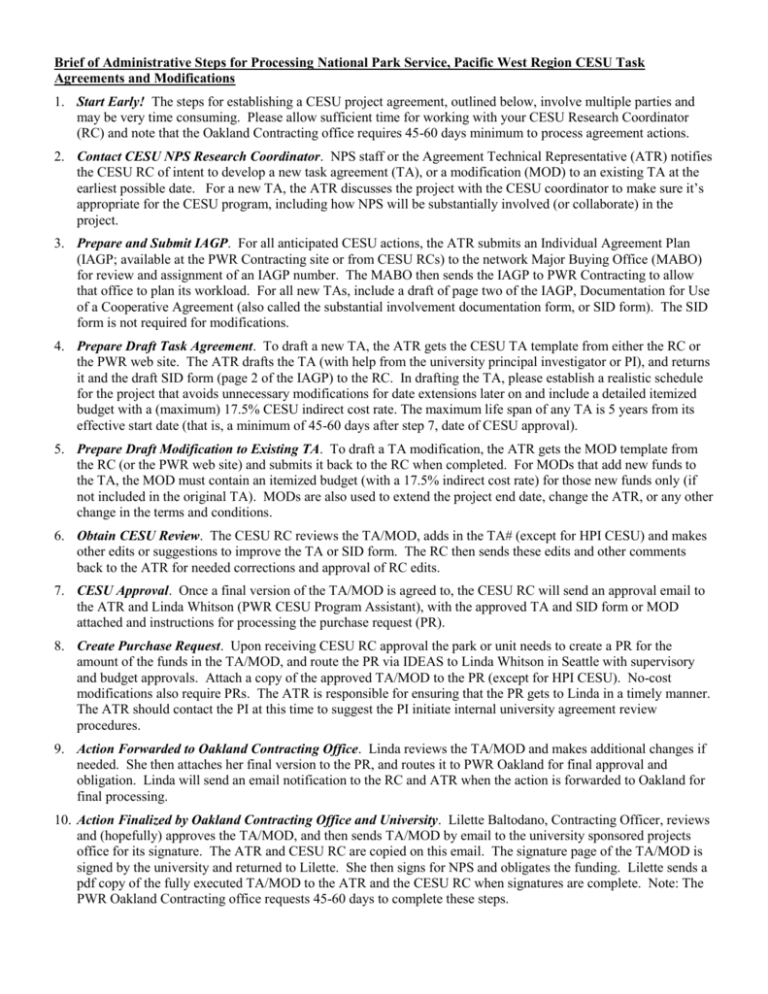
Brief of Administrative Steps for Processing National Park Service, Pacific West Region CESU Task Agreements and Modifications 1. Start Early! The steps for establishing a CESU project agreement, outlined below, involve multiple parties and may be very time consuming. Please allow sufficient time for working with your CESU Research Coordinator (RC) and note that the Oakland Contracting office requires 45-60 days minimum to process agreement actions. 2. Contact CESU NPS Research Coordinator. NPS staff or the Agreement Technical Representative (ATR) notifies the CESU RC of intent to develop a new task agreement (TA), or a modification (MOD) to an existing TA at the earliest possible date. For a new TA, the ATR discusses the project with the CESU coordinator to make sure it’s appropriate for the CESU program, including how NPS will be substantially involved (or collaborate) in the project. 3. Prepare and Submit IAGP. For all anticipated CESU actions, the ATR submits an Individual Agreement Plan (IAGP; available at the PWR Contracting site or from CESU RCs) to the network Major Buying Office (MABO) for review and assignment of an IAGP number. The MABO then sends the IAGP to PWR Contracting to allow that office to plan its workload. For all new TAs, include a draft of page two of the IAGP, Documentation for Use of a Cooperative Agreement (also called the substantial involvement documentation form, or SID form). The SID form is not required for modifications. 4. Prepare Draft Task Agreement. To draft a new TA, the ATR gets the CESU TA template from either the RC or the PWR web site. The ATR drafts the TA (with help from the university principal investigator or PI), and returns it and the draft SID form (page 2 of the IAGP) to the RC. In drafting the TA, please establish a realistic schedule for the project that avoids unnecessary modifications for date extensions later on and include a detailed itemized budget with a (maximum) 17.5% CESU indirect cost rate. The maximum life span of any TA is 5 years from its effective start date (that is, a minimum of 45-60 days after step 7, date of CESU approval). 5. Prepare Draft Modification to Existing TA. To draft a TA modification, the ATR gets the MOD template from the RC (or the PWR web site) and submits it back to the RC when completed. For MODs that add new funds to the TA, the MOD must contain an itemized budget (with a 17.5% indirect cost rate) for those new funds only (if not included in the original TA). MODs are also used to extend the project end date, change the ATR, or any other change in the terms and conditions. 6. Obtain CESU Review. The CESU RC reviews the TA/MOD, adds in the TA# (except for HPI CESU) and makes other edits or suggestions to improve the TA or SID form. The RC then sends these edits and other comments back to the ATR for needed corrections and approval of RC edits. 7. CESU Approval. Once a final version of the TA/MOD is agreed to, the CESU RC will send an approval email to the ATR and Linda Whitson (PWR CESU Program Assistant), with the approved TA and SID form or MOD attached and instructions for processing the purchase request (PR). 8. Create Purchase Request. Upon receiving CESU RC approval the park or unit needs to create a PR for the amount of the funds in the TA/MOD, and route the PR via IDEAS to Linda Whitson in Seattle with supervisory and budget approvals. Attach a copy of the approved TA/MOD to the PR (except for HPI CESU). No-cost modifications also require PRs. The ATR is responsible for ensuring that the PR gets to Linda in a timely manner. The ATR should contact the PI at this time to suggest the PI initiate internal university agreement review procedures. 9. Action Forwarded to Oakland Contracting Office. Linda reviews the TA/MOD and makes additional changes if needed. She then attaches her final version to the PR, and routes it to PWR Oakland for final approval and obligation. Linda will send an email notification to the RC and ATR when the action is forwarded to Oakland for final processing. 10. Action Finalized by Oakland Contracting Office and University. Lilette Baltodano, Contracting Officer, reviews and (hopefully) approves the TA/MOD, and then sends TA/MOD by email to the university sponsored projects office for its signature. The ATR and CESU RC are copied on this email. The signature page of the TA/MOD is signed by the university and returned to Lilette. She then signs for NPS and obligates the funding. Lilette sends a pdf copy of the fully executed TA/MOD to the ATR and the CESU RC when signatures are complete. Note: The PWR Oakland Contracting office requests 45-60 days to complete these steps. Key to Acronyms: ATR Agreement Technical Representative CESU Cooperative Ecosystem Studies Unit IAGP Individual Agreement Plan IDEAS Interior Department Electronic Acquisition System MABO Major Acquisition Buying Office MOD Modification (to a Task Agreement) NPS National Park Service PR Purchase Request PWR Pacific West Region RC Research Coordinator SID Substantial Involvement Documentation TA Task Agreement

